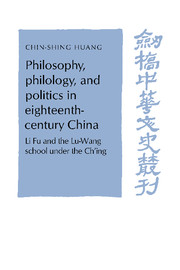 Philosophy, Philology, and Politics in Eighteenth-Century China
Philosophy, Philology, and Politics in Eighteenth-Century China Published online by Cambridge University Press: 17 September 2009
This study will explain the general intellectual climate of the early Ch'ing period and explore the political and cultural characteristics of the Ch'ing regime at the time. To achieve these ends I have focused on the Lu-Wang school, but will pay special attention to Li Fu (1675–1750), the most outstanding representative of this school in the early Ch'ing. By the early Ch'ing, the Lu-Wang doctrines had undergone several transformations. Li Fu's thought can be seen as the final Lu-Wang response to the Ch'eng-Chu school. Early Ch'ing rulers and scholars generally blamed the left wing of the Wang Yang-ming school for the fall of the Ming dynasty. Yet Li Fu demonstrated successfully that a Lu-Wang scholar could still lead a viable intellectual life even after the Ming. In other words, the Lu-Wang school did not end with the fall of the Ming.
Stressing the transformative power that the mind has upon moral cultivation, the Lu-Wang scholar takes a critical stance toward book learning (tu-shu), even if he does not necessarily exclude it from the process of moral perfection. One among many distinctions between the Lu-Wang school and its rival, the Ch'eng-Chu school, resides in their differing attitudes toward the role book learning plays in their moral programs. For the Ch'eng-Chu school, book learning has an inherent positive value in the course of moral cultivation.
To save this book to your Kindle, first ensure [email protected] is added to your Approved Personal Document E-mail List under your Personal Document Settings on the Manage Your Content and Devices page of your Amazon account. Then enter the ‘name’ part of your Kindle email address below. Find out more about saving to your Kindle.
Note you can select to save to either the @free.kindle.com or @kindle.com variations. ‘@free.kindle.com’ emails are free but can only be saved to your device when it is connected to wi-fi. ‘@kindle.com’ emails can be delivered even when you are not connected to wi-fi, but note that service fees apply.
Find out more about the Kindle Personal Document Service.
To save content items to your account, please confirm that you agree to abide by our usage policies. If this is the first time you use this feature, you will be asked to authorise Cambridge Core to connect with your account. Find out more about saving content to Dropbox.
To save content items to your account, please confirm that you agree to abide by our usage policies. If this is the first time you use this feature, you will be asked to authorise Cambridge Core to connect with your account. Find out more about saving content to Google Drive.